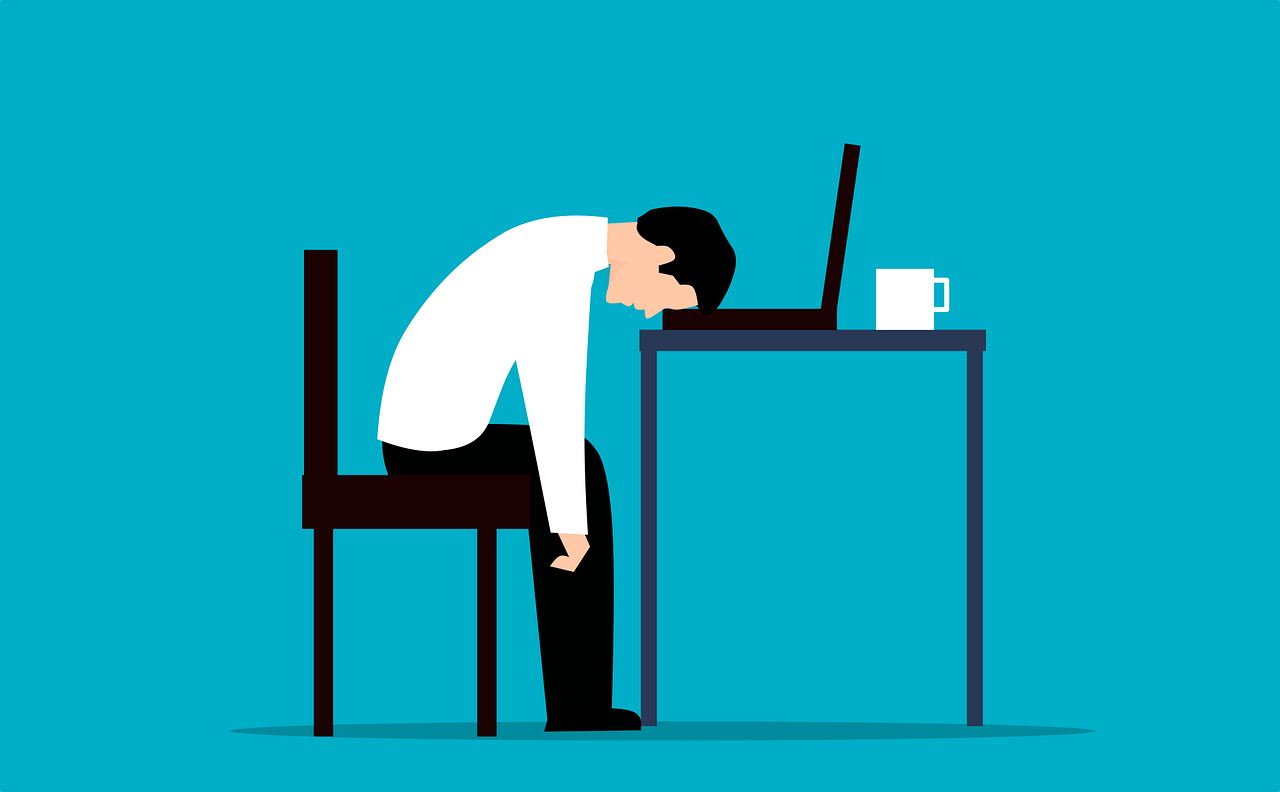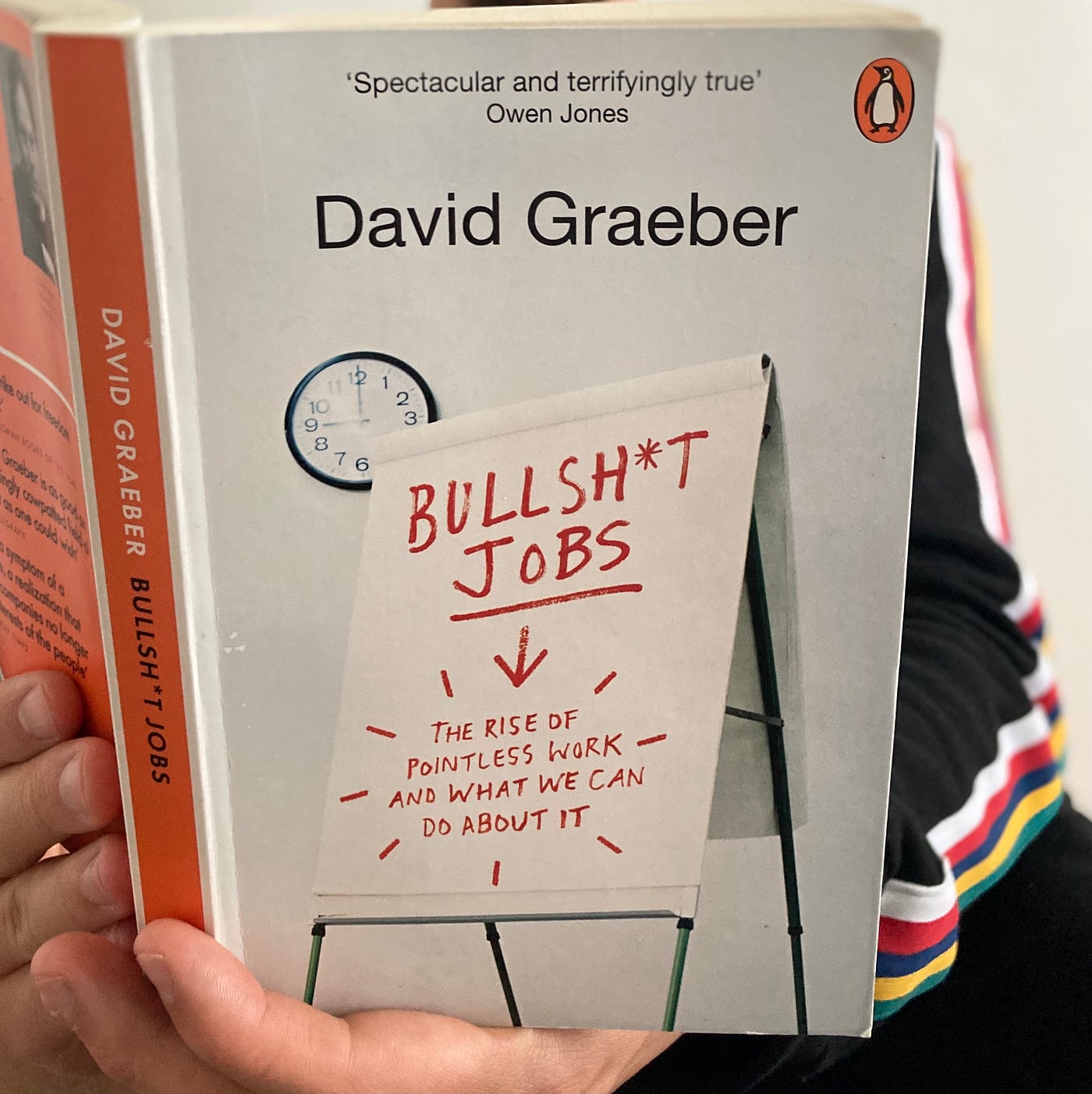Why Is Capitalism Creating An Economy That Is 40% Bullsh*t Jobs?
As a society, we’re forcing millions of people to go to offices five days a week, eight hours a day, and do nothing
If someone had designed a work regime perfectly suited to maintaining the power of finance capital, it’s hard to see how they could have done a better job. Real, productive workers are relentlessly squeezed and exploited. The remainder are divided between a terrorized stratum of the, universally reviled, unemployed and a larger stratum who are basically paid to do nothing, in positions designed to make them identify with the perspectives and sensibilities of the ruling class (managers, administrators, etc.) — and particularly its financial avatars — but, at the same time, foster a simmering resentment against anyone whose work has clear and undeniable social value. -David Graeber
Irecently read David Graeber’s classic book, Bullshit Jobs, and as suspected, it was entertaining while being mind-blowingly enlightening. His anthropological knowledge, crowdsourced first-hand accounts, and writing chops made this the fastest book I’ve read in a long time.
As a whole, it’s an awesome observation of a terrifyingly stupid economic phenomenon and in classic Graeber fashion, an excellent societal critique.
So, what is a bullshit job, and are you working one?
His definition of a bullshit job is: a form of paid employment that is so completely pointless, unnecessary, or pernicious that even the employee cannot justify its existence even though, as a part of the conditions of employment, the employee feels obliged to pretend this is not the case.
A bullshit job is not to be confused with a shitty job. Making Big Macs, collecting garbage, or cleaning office buildings are not bullshit jobs. They all serve a purpose, and society would surely notice their absence. Service jobs or blue-collar work are rarely bullshit, and the last year showed that.
There are also whole sectors of the economy that are basically bullshit from a value production standpoint — I particularly like economist Michael Hudson’s critiques of the FIRE sectors (Finance, Insurance, and Real Estate). The world would be much better off without political lobbyists, corporate lawyers, PR firms that launder the image of dictators, or advertisers that manipulate us into thinking we can’t be happy unless we’ve purchased the correct hair products, sneakers, or fleet of jet skis.
It’s all horrifying, a lot of it is useless, and some jobs within those industries could fall into the category of bullshit jobs, but they’re not all necessarily the bullshit Graeber is talking about.
So, where are all of these bullshit jobs, who’s working them, and why do they exist?
They’re everywhere, but one would be surprised to hear that they are not all in the government — not by a long shot. Free market fundamentalists have an impossibly hard time believing that a firm would hire someone to do nothing, but they do it all the time — I’ve got evidence Mr. Friedman!
Typically, bullshit jobs are white-collar office positions that pay well. From the testimonials, a secretary at a Dutch publishing company whose main responsibility was keeping a bowl of mints full comes to mind. Or the guy hired to run an in-firm communication network that nobody at the company used. Or the security guard who had to watch over an empty room in a museum for eight hours a day and wasn’t allowed to bring anything to help him pass the time.
The rise of managerial and administrative positions over the last fifty or sixty years has added to the vastness of the BS. Scores of middle manager and executive VP positions have been created, often serving no purpose beyond leading meetings and keeping a hawkish eye on employees who don’t need hyper-diligent supervision. Many of them wrote to Graeber about how little they do and how, among their manager-level coworkers, they’re not allowed to say it out loud.
The bullshit is everywhere, and reading people’s first-hand experiences was fascinating, comical, and sad. It is surprisingly difficult mentally, emotionally, and spiritually to spend forty hours a week knowing you’re making zero difference and utterly wasting your time.
There’s also the phenomenon Graeber terms, the bullshitization of work

Parallel to the bullshit jobs phenomenon, it is increasingly common that productive, important workers, like nurses or teachers, are spending more time not doing what they’re hired to do.
They’re filling out compliance forms, attending BS meetings, or doing performance reviews. To be clear, every job has elements of bullshit. And the data-driven, quarterly metrics, fill-out-these-forms, and submit them to x-y-and-z aspects of most work are going up.
Also, there are millions and millions of people whose jobs aren’t complete bullshit, but they go to the office every day and could finish their work in a few short hours. But, modern capitalism being modern capitalism — one doesn’t get the full value they create nor have they sold their services alone — they’ve sold forty hours of their week, so they stretch out their daily tasks, pretend to be busy, and are forced to stay until five pm.
It’s way more common than you think
The Pew Gov poll Graeber cites throughout the book while being a few years old now, showed that 37% of workers thought of their jobs as completely useless. That’s a rough figure but still, one in three people feels that their job makes zero impact on the world.
Add the ancillary services for those BS jobs, like cleaning and maintaining the BS offices, as well as the services that arise from people being too busy, like dog washers or meal prep services, and the hardly-necessary portion of the economy inches even closer to half the workforce.
The problems in the world are many, and a huge percentage of the working population is spending most of their lives engaged in meaningless bullshit.
Why are we doing this to ourselves?
Being an anthropologist, Graeber goes through the history of what we call work in Europe and America. He traces the feudal practice where most people sent their own children to be servants in others’ homes for seven to fifteen years as part of their “progression” into adulthood. The thought was that one wasn’t a perfected human until they had been taught to be properly subservient.
There’s also what we refer to as the protestant work ethic. And there’s a puritanical vein to all of this as well. It’s the mentality that persevering through the drudgery is an act of character, a show of moral fortitude. The work isn’t important: the suffering is.
Puritanism: the haunting fear that someone, somewhere, may be happy. H.L. Mencken
Valuing ourselves and our worth based on a job is a psyche that runs deep, and yet, most people hate their jobs. In one of the middle manager testimonies, this guy named Clement said it best: “the pressure to value ourselves and others on the basis of how hard we work at something we’d rather not be doing… if you’re not destroying your mind and body via paid work, you’re not living right.”
I feel I need to make the caveat that, of course, working hard is a virtue. But what are we working on? To what end? And, is there any balance with other things in life like family, community, and personal development?
Hard work is a virtue, but why the hell aren’t we, as a society, working harder to solve the myriad of real problems we have? Poverty, homelessness, hunger, global freaking warming, the many refugee crises, political corruption, plastic in the ocean, plastic everywhere, the disappearing rainforests, air pollution, the sixth mass extinction in planetary history, the rise of fascism, obesity, and COVID-19 are just a few of the problems we need to address.
And roughly one in three workers feels that they’re completely wasting their time for forty-plus hours a week.
What are we doing?
David Graeber was a much smarter man than I’ll ever be, and he didn’t offer a list of policy solutions, so I’m not going to either. He does mention that UBI would be a step in the right direction. In the final chapter, he has passages from his correspondence with activists from the Wages for Housework movement and wrote about how they came to the same conclusion that UBI makes sense.
People are doing critically important things for a society like raising children or caring for their elderly parents but have to worry about making rent or living on the street. While, at the same time, chunky middle managers are trying to get the buffalo sauce stains out of their khakis and pretending to be busy for eighty grand a year.
Again, what are we doing?
UBI would go a long way to disconnecting work from basic survival. It would give people a bit of room to breathe and freedom from the economic boot on their neck. On its own, it wouldn’t be enough, but it’d be something.
The mindset also needs to change. We are more than our jobs. Graeber made the point that on our tombstones, we rarely put VP of International Development, Head of Procurement, or Assistant Regional Manager — except maybe Dwight Shrute.
So why do we identify so strongly with our jobs?
They say economics is the study of who gets what and why in a society. These days in the US and to a degree in Europe, the prevailing economic ideology is warped to the point of psychosis.
We’d rather let the six Walton kids — who inherited every penny and didn’t build a thing — have six mega-mansions each, six mega-yachts, six Gulf Stream jets, and unimaginable wealth for each of their offspring for the next sixty-six generations than let a portion of the population earn more or work a little less for the same money?
I believe that this instinct to perpetuate useless work is, at bottom, simply fear of the mob. The mob (the thought runs) are such low animals they would be dangerous if they had any leisure; it is safer to keep them too busy to think. -George Orwell
In the first half of the 20th century, economists like John Maynard Keynes predicted that because of technology, by the year 2000, we’d have 15 hour work weeks. Why does the premier economic mind of his time, the man who created the post-WWII, Bretton-Woods framework that rebuilt Europe and the world, sound like a crackpot in 2021?
We could be living that life. Instead, wages have stagnated for people doing service or blue-collar jobs, so they’re working harder than ever to simply get by. At the same time, many middle managers and administrators are cleverly “staying busy,” but swimming in shame because they’re getting paid while not contributing to society.
With current technology, it would not be that hard to materially provide for all on earth. The planet can easily sustain the needs of the many; it cannot sustain the greed of the rich.
Let’s change our mindset around work, value, and whether people “deserve” to live if they’re not completely sacrificing themselves to the economic machine.
Let’s cut the bullshit.
It’s hard to imagine a surer sign that one is dealing with an irrational economic system than the fact that the prospect of eliminating drudgery is considered to be a problem.
David Graeber

/cdn.vox-cdn.com/uploads/chorus_image/image/70735916/bhayward_final.0.jpg)

